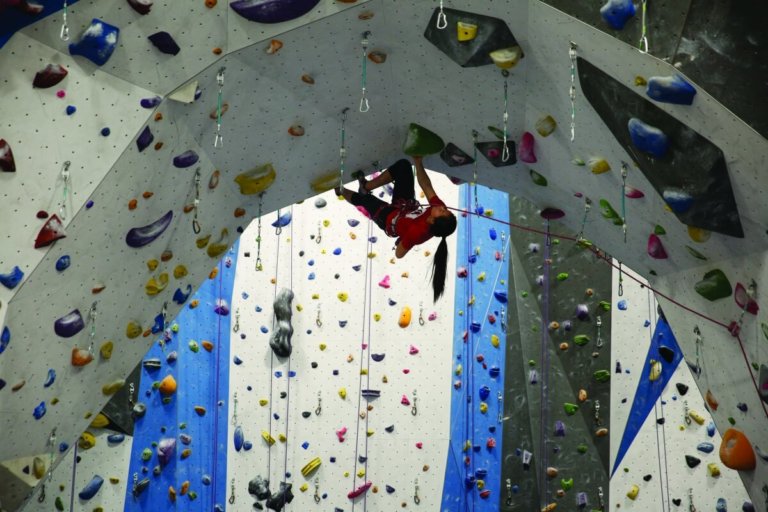When Alena Holbert looks at a rock face, it’s likely she sees something very different than most. Besides seeing overhanging walls, slabs and vertical faces, the member of the Varsity Climbing team at CA is probably also sizing up possible hand holds and foot placement. That’s because to Alena, rock faces and climbing walls are “more like puzzles,” and figuring them out is one of her favorite exercises.
“It’s physical and mental,” says Alena, “which is what climbing is about.”
The joy of the challenge is one reason the JV Climbing Coach and Director of Experiential Education, Forbes Cone, thinks the sport has begun to soar at CA. Beginning 25 years ago as a recreational group, climbing has become a competitive team only in the past two years, also fulfilling the athletic requirement. What were 24 students in the 2015-2016 program, has nearly doubled this year to include 42 students. Together, they make up the Varsity, JV and Middle School C-team.
Coached by the likes of Suzu Jeffery, who recently participated in the IFSC Climbing World Championships in Paris, as well as Garrett Blair and Amaya Bayne, who both also compete, the students are in good hands.
Many of those students begin on the Middle School C-team, where they learn techniques like power, endurance, safety, and technical skills. Those skills are built upon in preparation for competition on the JV and Varsity teams, which participate in seven competitions throughout the season. They face other private and public school teams, including Colorado Christian, Cherry Creek School District, and Kent Denver, to name a few.
To prepare, the climbers meet a few times a week, honing their skills on CA’s climbing wall. They also practice at the Denver Bouldering Club in Denver and Earth Treks Climbing Gym in Golden.
The climbing wall itself speaks to the history of the sport at CA. It was named for Andrew Shapiro ’85, an alum who died in a climbing accident in 1995, when his classmates, friends and family donated the wall in his honor. When practicing on it today, the scene is far from morose: Punctuated by colorful handholds, students shout encouragement to their partners who are suspended high above on rope.
Camaraderie, collaboration and sportsmanship are all things one would expect to find on a team. But what’s unique about the climbing program is its makeup. Unlike many traditional sports teams, climbing is co-ed.
“I think that environment is really healthy – interacting with different genders in the same space,” says Cone. “Honestly, it’s hard for a girl to hang on the soccer field with guys. But in climbing, girls can be every bit as capable and perform every bit as well as the boys.”
Just ask Alena. The sophomore first began climbing recreationally while attending Renaissance Expeditionary Learning Outward Bound School until sixth grade, when she transferred to CA. She has made Nationals five times, winning first place at Regionals and Divisionals this year alone—her first year on the Varsity team at CA.
While Alena enjoys the accolades, she says that climbing isn’t about competing against other people. “I enjoy competitions, but for me, it’s because I like seeing the supportive environment. People from other teams will cheer you on, or even belay you. But really, it’s about competing with yourself and focusing on what’s right in front of you and nothing else.”
Adds Cone: “Climbing is all about personal improvement, and not necessarily about absolute skill.”
Still, the CA climbing team clearly has skill. In the program’s second year, the girls Varsity team took first place at Regionals while the boys took second place. From there, both teams moved on to State, where the girls took second place, and Alena placed first individually.
“Between the Varsity and JV teams, we had 31 students compete at State, compared to 14 in 2016, which tells me that climbing has caught fire at CA,” says Cone.
Indeed, it has caught fire, not only at CA, but across the globe. In 2020, for the first time ever, climbers will compete for gold in the Olympic Games in Tokyo.
“I think the interest in climbing is increasing because of the amount of personal growth that is possible. Also, when it comes to competing in the sport of climbing, it’s not a zero-sum game – meaning if someone wins, that doesn’t mean you lose,” says Cone.
